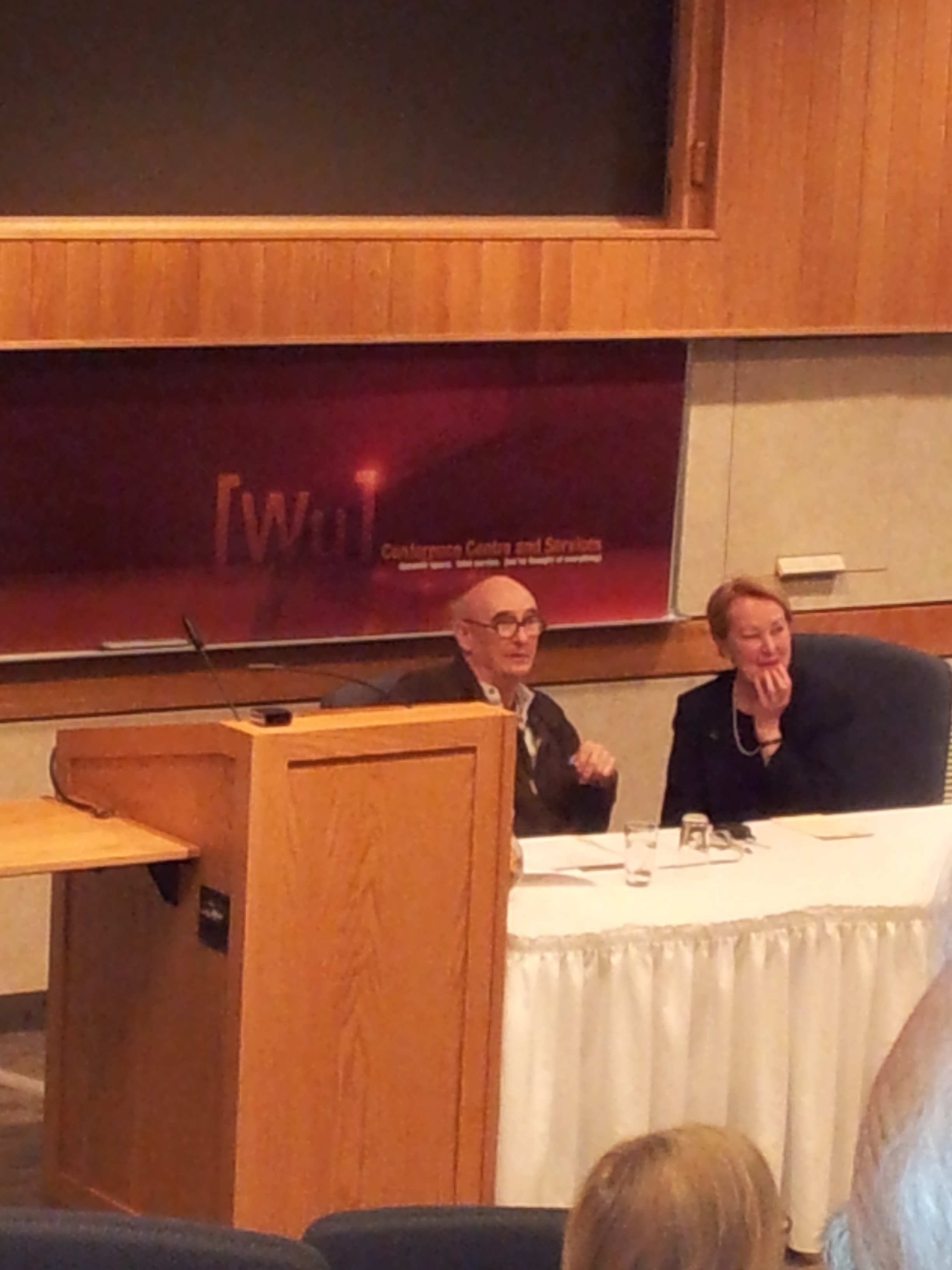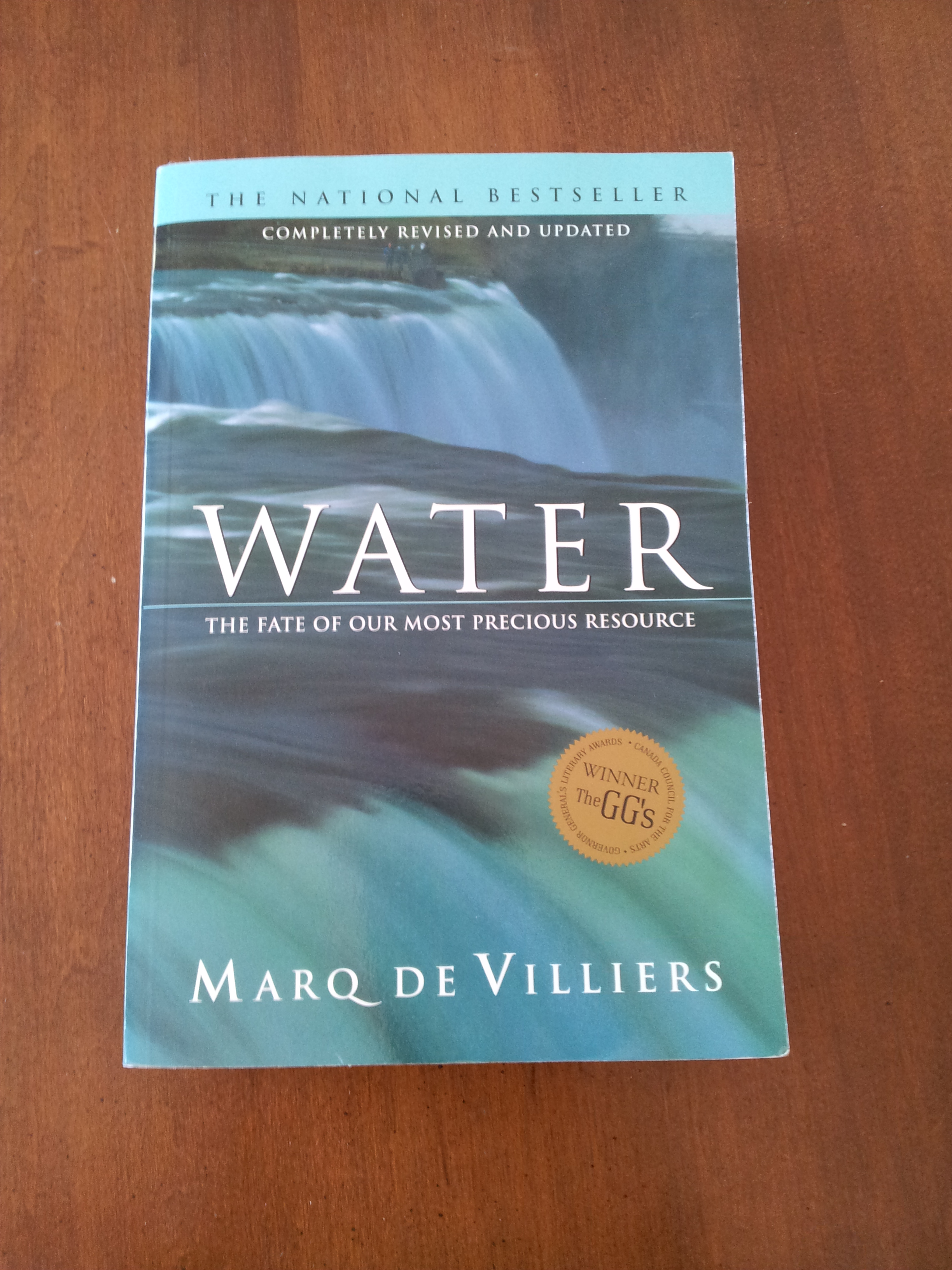Marq de Villiers' lecture at UNB
For World Water Day / Canada Water Week 2014, I decided to repost these lecture notes from a couple of years ago (originally shared on Facebook).
Introduction
On 15 March 2012, I went to a public lecture at the University of New Brunswick by author/journalist Marq de Villiers. The lecture was part of a water-themed series being put on by UNB's Andrews Initiative.
I was interested to attend this lecture, not only because of my interest in the topic of water, but also because I have Marq de Villiers' book Water: The Fate of Our Most Precious Resource and have found it to be a very well-written and engaging book on the topic.
The program for the lecture included the following description, which I agree with:
The New Yorker called the book "exceptionally persuasive because he does not scold or inveigh but lucidly and readably reports." And despite all the grim and disturbing things he learned in the process of researching the book, de Villiers remains hopeful about our options for the future.
The Lecture
- He started with what he calls "The parable of the dead camel," from something he saw when he was touring the Sahara Desert for another book he wrote. A Taureg village he visited had a dead camel rotting in the pond that was their only water source. He learned that no one removed it because no one knew whose camel it was, and in that culture it is not allowed to interfere with another man's camel. He then pointed out the parallel with water issues in the wider world that go unsolved because we can't agree whose responsibility they are.
- He explained that there are two over-lapping crises related to water: contamination/quality and supply/quantity. On the first, he feels that there has been considerable progress in the past decade; the world is also making progress on the second, but not quickly enough, in his opinion.
- For example, in the past decade 1 Billion people have gained access to safe drinking water. However, more than 1 Billion people have been born during the same period.
- One region of great progress in water conservation—also a region of great water need—is China.
- He made a provocative statement about the Ogallala Aquifer which has featured prominently in the Keystone XL pipeline controversy. He pointed out that the Nebraska farmers who expressed concerns that the pipeline could damage the aquifer were themselves the culprits for serious damage to it. The aquifer apparently receives 0.5"/yr. of recharge while the water withdrawal allotments add up to 20"/yr. This is tied up in the water law of the western US, which he called "Anti-Conservation" due to its "use-it-or-lose-it" principle for apportioning water withdrawal rights. On a similar note, he pointed out that the Colorado River is completely spoken for, to the extent that it doesn't really reach the sea any more.
- Midway through his talk, Mr. de Villiers shifted from discussing the problems to focussing on solutions. He said there were 2 issues that complicate solutions, but I think he only mentioned one. Namely, that the growing human population would continue to stress water supply and quality.
- However, he is hopeful that both pollution and supply problems are amenable to solutions, and spent most of the rest of his talk pointing to what he sees as positive examples.
- He talked about the improving water quality in the Rhine River and quipped that the Germans were the good guys in this particular story. As someone working in the field of water, I can vouch that there's a lot of expertise in Germany (and nearby countries like Switzerland and the Netherlands).
- Another hopeful sign is the partial recovery of the [northern portion of the] Aral Sea, through a partnership between the government of Kazakhstan and the World Bank (which he admitted to not always approving of).
- In Niger, there has been some success at reforestation on the margins of the Sahara Desert after the government gave the local people ownership (i.e. rights to the fruit and other products derived from them) over the trees there. The city of Boston has cut its water use by 30% in a decade by mandating the use of low-flow appliances in its building code. In Minneapolis, the use of water-permeable concrete for paving has reduced urban run-off. Windhoek, Namibia now recycles 100% of its wastewater to drinking water quality.
- Marq de Villiers mentioned that Coca-Cola and Pepsico have started clean water projects around the world, in an attempt to mitigate some of the bad publicity that has accrued to them over their bottled water sales.
- The only time during the presentation that I rolled my eyes was when he mentioned the "Playpump" as a positive initiative (read the linked post if you don't understand).
- Another positive sign he mentioned was water treaties between countries that are not otherwise that friendly to each other, such as Israel-Jordan and India-Pakistan.
- Mr. de Villiers is optimistic about the contributions of technological progress toward solving water problems. He said, "A lot of people in NGOs are mistrustful of engineers, and I think this is wrong-headed."
- He concluded by saying that we can't look at water issues alone; they are tied up with matters such as population growth, energy, sustainable agriculture, and climate change. He said that, "Problems reinforce each other, but solutions can enable each other," in reference to these inter-connected issues.

Q and A
- The first question was on "fracking", which is a hot topic in New Brunswick right now. He said he was "agnostic" on the matter (and on genetically-modified organisms, nuclear power, and hydro-electric dams, while we're at it)—he looks at both sides of the issue and tries to stick to the evidence. His information (which was correct, as far as I know, at least at the time) is that there isn't really evidence of fracking contaminating deep aquifers, and surface contamination is likely due to spills rather than being intrinsic to the process. In his opinion—and I agree—the top priority with respect to fossil fuel usage should be to get off of coal.
- On a question about the effects of climate change on water supply in Canada, he said that the computer models being used aren't really fine-grained enough to make confident predictions at the regional level, but that north-east North America will likely see increased precipitation, and the prairies, less.
- I asked for his opinion on how to decide when water reuse is worthwhile, since it tends to be very energy-intensive. His answer was rather rambling (which is, of course, a speaker's perogative) but came down to the idea that the use of fossil fuels to facilitate water reuse would generally amount to fueling a more critical problem (i.e. global warming) to solve a less critical one (water shortage).
General Impressions
- The presentation started out a bit dry, but got more engaging as it went on. Marq de Villiers became more enthusistic as he moved to talking about solutions, it seemed to me.
- His positions on water and environmental issues are pretty close to mine, as far as I could tell from his presentation.
Differences from the Book
The most recent edition of his book Water was published in 2003 and I noticed one major difference between it and the lecture. In the book, he writes a lot about mega-projects such as efforts in China to divert part of the Yangtze River to the drier northern part of the country, and towing ice-bergs from Antarctica to the Arabian peninsula. Audacious mega-projects like that didn't really feature in the lecture. In the case of the Chinese plan, he did mention that the authorities there are now focussing more on conservation (a much more reasonable and realistic plan), while other crazy schemes didn't get mentioned.

Finally, note that while not every day is Water Day at the Drafting Table, water is a frequent theme here. Over the next month or so, planned posts on the topic of water include:
- A review of Water: the Epic Struggle by Steven Solomon
- A map of NB watersheds
- An analysis of the timing of river ice break-ups